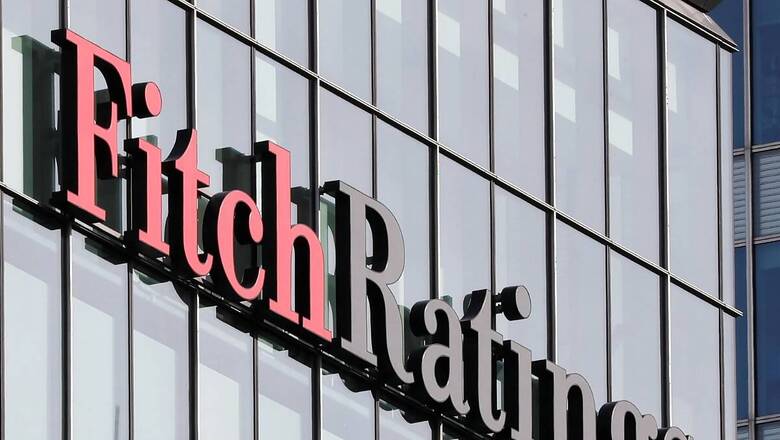
views
Fitch US Rating Impact On Indian Markets: Fitch Ratings has downgraded the United States of America’s (USA) Long-Term Foreign-Currency Issuer Default Rating (IDR) to ‘AA+’ from ‘AAA’ due to “fiscal deterioration” and “erosion of governance”. The rating agency has assigned a ‘Stable Outlook’ in place of the current ‘Rating Watch Negative’. The Country Ceiling has been affirmed at ‘AAA’.
“The rating downgrade of the United States reflects the expected fiscal deterioration over the next three years, a high and growing general government debt burden, and the erosion of governance relative to ‘AA’ and ‘AAA-rated peers over the last two decades that has manifested in repeated debt limit standoffs and last-minute resolutions,” Fitch Ratings said in a statement.
The BSE Sensex as on 12:50 pm on Wednesday, August 2, was trading lower by 610.7 points or 0.92 per cent at 65,834.8 points, while the NSE Nifty was down by 203.7 points or 1.05 per cent at 19,528 points.
Fitch Ratings Meaning
Fitch Ratings publishes credit ratings that are forward-looking opinions on the relative ability of an entity or obligation to meet financial commitments. Credit ratings are indications of the likelihood of repayment in accordance with the terms of the issuance.
In the national long-term credit ratings, Fitch gives ratings between ‘AAA’ to ‘D’. ‘AAA’ National Ratings denote the highest rating assigned by the agency, denoting the lowest expectation of default risk relative to all other issuers. ‘AA’ denotes expectations of a very low level of default risk relative to other issuers or obligations in the same country or monetary union.
‘D’ is given to those that have entered into bankruptcy filings, administration, receivership, liquidation or other formal winding-up procedure or that has otherwise ceased business.
Expertspeak: What Does It Mean for Indian Markets, Economy?
Experts said that the decision of the rating agency Fitch will have an impact on the Indian markets but that is likely to be “minor” and “short-lived”. They said it could provide an opportunity for some investors to take profits.
Vivek Iyer, partner at Grant Thornton Bharat, said, “The downgrade of the US economy rightly reflects the increasing country risk on account of the political risk due to the bi-partisan nature of the polity which has become the feature of the US politics. This has substantially impacted the role of the dollar on account of the reduced role of the US role in world finance today. This will significantly strengthen the currencies of the Asian economies.”
He added that coordinated dollar purchases by the Asian economies are now expected to keep their currencies within a range and protect their export competitiveness. “We will also see an increased adoption of bilateral settlements in non-dollar currencies, some of which are already underway.”
On its impact on the Indian markets, Mukesh Kochar, national head (wealth) of AUM Capital, said, “Fitch has signalled a possible downgrade in May before the debt ceiling agreement is reached. However, the timing might have surprised the market. Anything happening in the US always impacts the world market.”
He, however, added that the impact should be short-lived as one rating agency S&P has already downgraded the US to AA+ beforehand. This time, the impact should be for a couple of days and the market may focus on other fundamental factors. “Impact on the Indian market should also be short-lived, and other factors such as earnings, crude prices and RBI policy and fund flows will be the key to the market. Having said that, the market is heated the world over and may find a reason to correct it.”
V K Vijayakumar, chief investment strategist at Geojit Financial Services, said, “The downgrade of the US credit rating by a notch is sentiment-negative for global markets. The US 10-year bond yield spiking above 4 per cent and the dollar index rising to 102 are near-term negatives for emerging markets.”
He, however, added that the downgrade does not say anything that the market does not know. “So, the negative knee-jerk reaction will be short-lived. Globally, equity markets have been rising on the US economy’s soft landing narrative. The downgrade doesn’t alter that.”
Santosh Meena, head (research) at Swastika Investmart, said, “The recent downgrade of the US rating by Fitch may have a minor impact on the Indian market, but it is unlikely to be a major concern since rating changes often come with certain repercussions. Nevertheless, it could provide an opportunity for some investors to take profits, leading to a possible pullback in the market.”
He added that signs of exhaustion are evident at higher market levels, following a strong rally from the lows in March. Foreign institutional investors (FIIs) have turned net sellers in the past few days, indicating a cautious stance in the market. “If the Nifty index begins to trade below its 20-Day Moving Average (20-DMA) around 19,600, it might experience further declines toward 19,300 and 18,888 levels.”




















Comments
0 comment